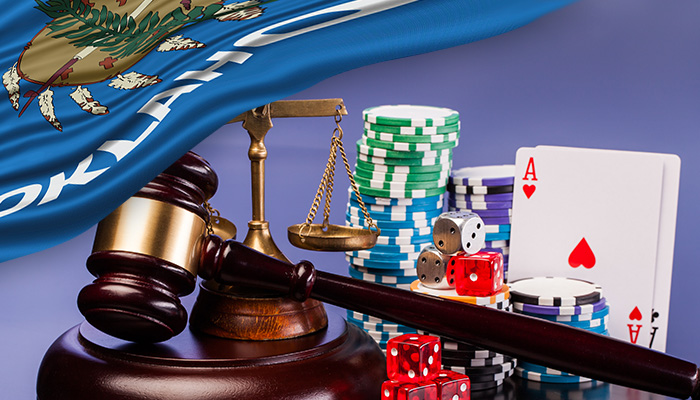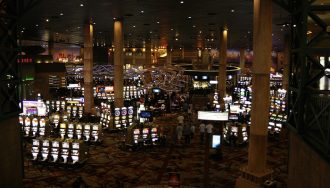Gambling in Oklahoma – Laws & History
 Current Oklahoma Gambling Laws
Current Oklahoma Gambling Laws
Oklahoma only has about 4 million people, but due to the resettlement of many indigenous tribes from the East on Oklahoma territory land 200 years ago, Oklahoma is home to about 140 tribal casinos. The American Gaming Agency says these casinos have a $12 billion economic impact and create about 90k jobs.
While most of the rest of Oklahoma has very restrictive gaming laws, the tribes continue to build bigger and better resort hotels with world-class amenities. While these remain mainly a regional draw, many of the tribes in Oklahoma have made it clear that they have both National and even International ambitions.
What Are Today’s Gambling Laws in Oklahoma
Oklahoma is home to some of the largest casinos in the world, with the enormous Winstar in Thackerville, Oklahoma, featuring more than 600,000 square feet of gaming and the largest casino in the world. The Choctaw casino in Durant has more than 7100 slots and over 100 table games in about 220k square feet of gaming, and there are more than 140 other tribal casinos dotted across the Plains of Oklahoma, owned by 31 different tribes.
Yet, Oklahoma gambling laws are some of the more restrictive in the country. What Gives? How can a state with the largest casino in the country and more than 100 others stretching from one end of the state to the other have strict gaming laws? Well, get ready to learn about the exciting world of tribal gaming.
- 🐄What Are Today’s Gambling Laws in Oklahoma
- 🐄Is Gambling Legal In Oklahoma?
- 🐄Getting A Gaming License in Oklahoma
- 🐄The Oklahoma Gaming Commission
- 🐄Conclusion
Is Gambling Legal in Oklahoma?
No. Gambling is illegal in the state of Oklahoma except for some Bingo-type class ii games at licensed racetracks where you can also bet the ponies. You can also play the lottery, but that is about the extent of legal gambling in Oklahoma. But because Oklahoma has been home to more than 60 Indian tribes, some having lived there for thousands of years but most forcefully migrated during the 18th century, they have vast swaths of tribal land which is sovereign and to which Oklahoma gambling laws amongst other state laws do not apply.
The Indian Gaming Regulatory Act was passed in 1988 and gives each tribe and reservation the right to negotiate with the state regarding gambling on their territory. By 1992, the state had allowed the Indians to begin offering parimutuel wagering on horse races. However, as money flowed to Oklahoma from these gaming compacts, Class II Indian Gaming and bingo rights were soon granted.
In 2004, they achieved class three gaming and table games with a victory at the ballot box. Now, they offer a Las Vegas-style resort experience with slots, table games, award-winning spas, beautiful golf courses, and hotels with thousands of rooms. But none of that is legal off the reservation except at a handful of horse tracks, and then no table games, no regular slots, just class Two gaming, and all other gambling anywhere in the state is a felony punishable by up to ten years in prison.
Getting a Gaming License in Oklahoma
Most licenses to operate tribal casinos go through the office of the Gaming Compliance Unit, an Oklahoma State Finance Department branch. This is their de facto version of the Oklahoma Gaming Commission.
Since there was such heavy interest in setting up and implementing these tribal gaming compacts, the state put together a sort of fill-in-the-blank pre-approval form that lays out what games can be operated, what amount the state will take as fees for annual assessments as well as one time start up fees.
They also included language about licensing individuals to work in the casinos, setting up tribal gaming agencies, and also terms about auditing, minimum requirements of payouts, and various other legal considerations.
Getting a gaming license in Oklahoma comes down to your tribe’s ability to meet the requirements of the IGRA and then complete a signed model Indian Gaming Compact.
Due to the compact’s language, most casino employees for tribal casinos will also require a gaming license, but each tribe’s gaming control agency issues these work licenses. For instance, if you will be working for the Choctaw Casino in Durant, you will be issued a permit to work from the Choctaw Gaming Commission after they research your suitability.
The Oklahoma Gaming Commission
While each tribal gaming commission does much of the heavy lifting, the Gaming Compiance Unit, which acts as the unofficial Oklahoma Gaming Commission, still reels in almost two hundred million in fees for the state each year.
They also mediate disputes and help guide public policy around decisive issues like the legal gambling age in Oklahoma, serving alcoholic beverages at tribal casinos, and other hot-button topics. They hold bad actors to account when they don’t meet the terms of their gaming compacts.
The Oklahoma Horse Racing Commission and its nine appointed commissioners control the three small horse tracks that offer class 2 bingo-style games. They approve casino licenses for qualifying horse tracks, slot equipment manufacturers, and track employees.
There has been renewed interest in both online sportsbooks and online casinos as online gambling in the US continues to expand. But so far, Oklahomans seem content with the laws already on the books and the status quo with the tribes contributing to the state’s tax base without gaming proliferating off tribal lands.
Conclusion
Oklahoma has had gambling since settlers arrived in the early 1800s. The days of the wide-open cow towns are long gone, and other than Indian Gaming on Oklahoma’s many Indian reservations, gaming is confined to just a few thousand Class II slot games scattered at three horse tracks around the state.
But due to the many tribes that were settled in Oklahoma and the IGRA regulations that allowed almost all tribes to negotiate a compact with the state for gambling on reservations, Oklahoma has not only some of the most casino licenses issued in the country but some of the biggest casinos by gaming space in the world.




